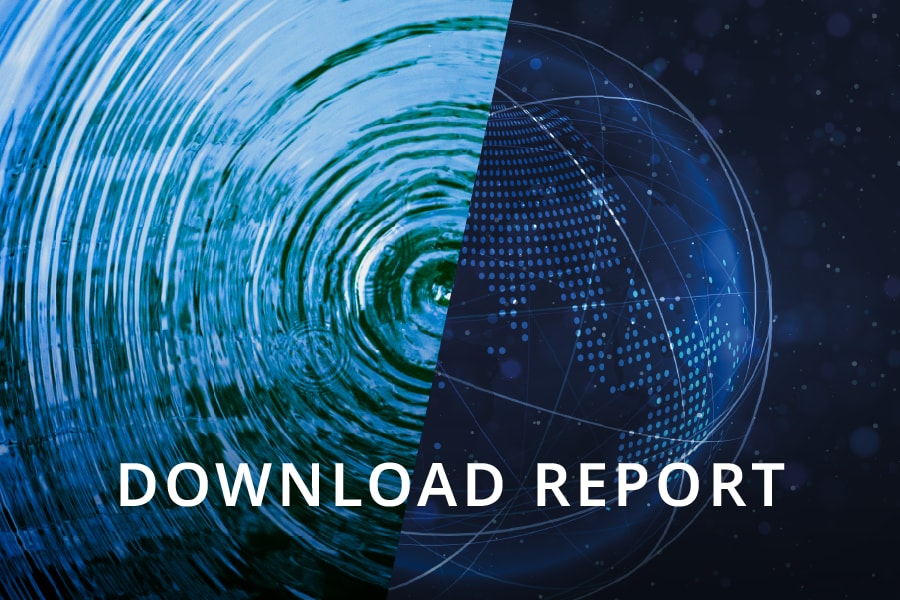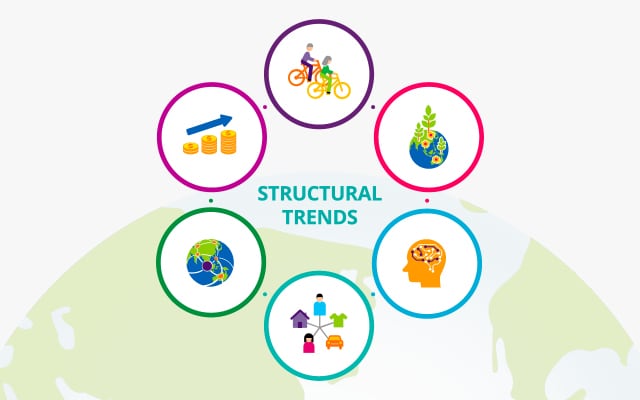Exploring the Promise of AI
Exploring the Promise of AI
In Brief
- Artificial intelligence has long been heralded as a game changer to the way we live and work. But is it the panacea that it appears to be?
- AI’s ability to gather data and act as a “brain” helps companies across markets and sectors make better decisions.
- Temasek and its ecosystem are investing in people to arm them with future-ready skills for the nearly 133 million jobs that AI and automation will create.
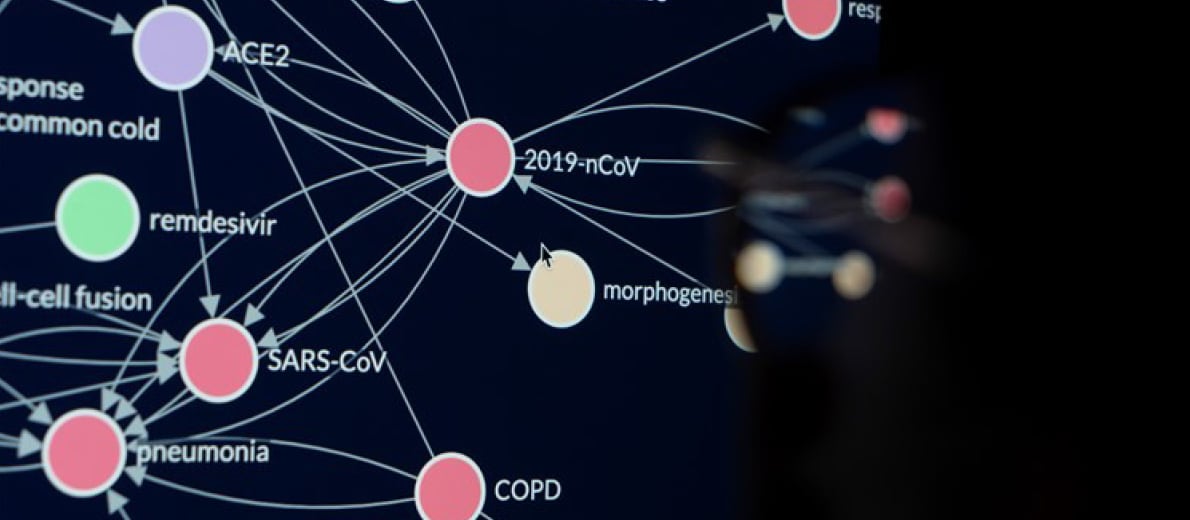
“Long and laborious.” That’s how Peter Richardson, Vice President of Pharmacology at BenevolentAI, describes the traditional drug discovery process.
Using conventional methods, it usually takes eight years before researchers discover a chemical compound that is promising enough to begin clinical trials, and hopefully, form a new drug. “That’s because for every 10,000 compounds tested, only 10 to 20 make it into pre-clinical research and trials,” says Richardson, who is also the co-founder of the London-based biotechnology firm.
Yet when the COVID-19 pandemic struck early this year, BenevolentAI’s artificial intelligence (AI) platform identified baricitinib, a commercially available drug for treating arthritis, as a possible COVID-19 treatment over the course of a weekend. Baricitinib is now being tested in over 12 clinical trials worldwide, and has demonstrated improved outcomes in early clinical use on over 800 hospitalised COVID-19 patients.
How did AI play a role in this lightning-speed discovery?
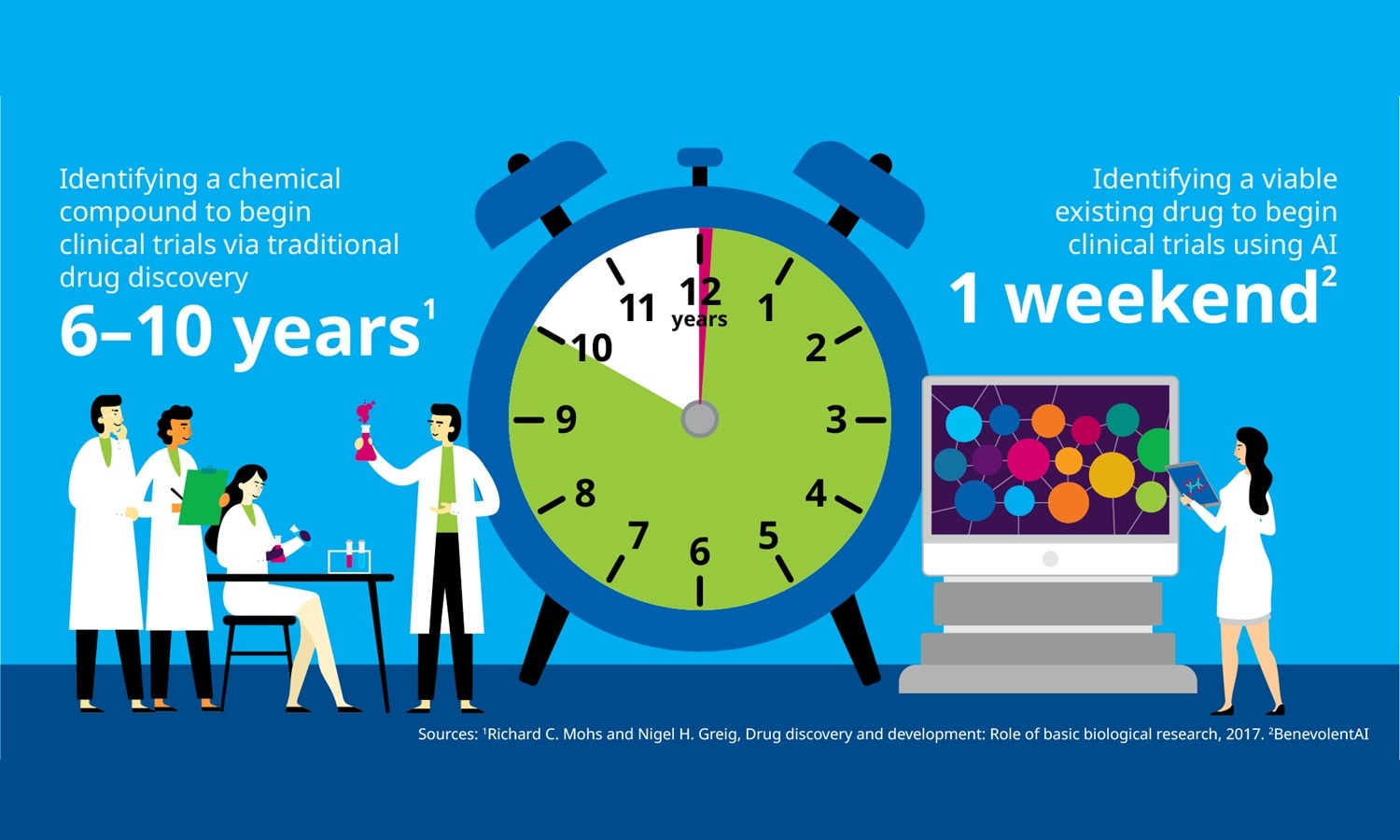
Speed is of the essence in the search for a treatment against COVID-19. AI has proven to be a vital ally in this endeavour.
Richardson professes that the discovery was new territory for the company, which had never applied its AI platform to examine infectious diseases. “We believed we had a duty to mobilise our technology for the public good in the current global health emergency,” he says.
Identifying the drug, however, was anything but fortuitous. “We would never have discovered this so quickly without years of investment in building our biomedical knowledge graph,” explains Anne Phelan, BenevolentAI’s Chief Scientific Officer.
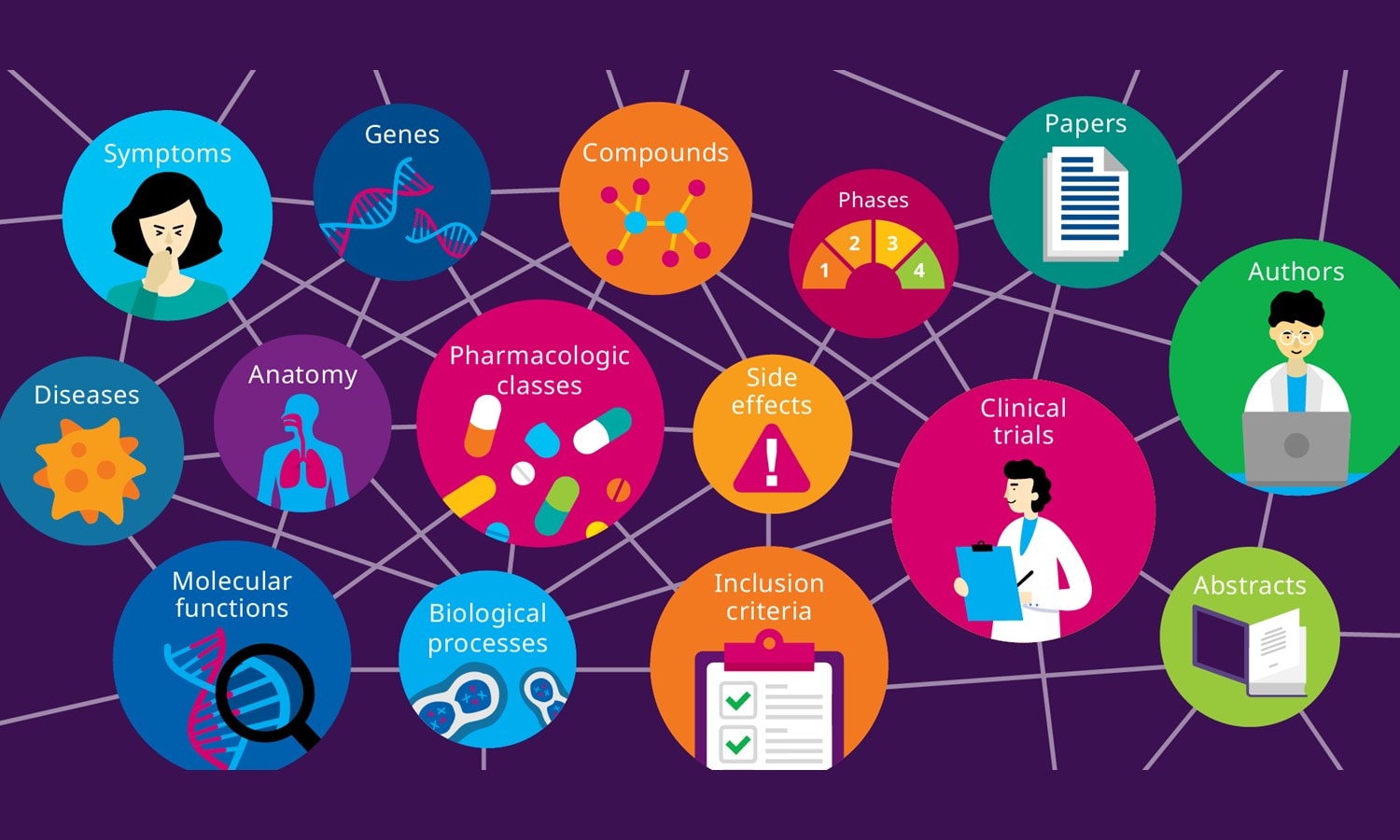
A knowledge graph is a database which graphically represents relationships between data points. BenevolentAI’s knowledge graph gathered data to uncover insights into the relationship between drugs and its effects on patients.
“AI’s power is unleashed when there is a large volume of raw data for the machine learning algorithms to feed on,” says Michael Zeller, Head of AI Strategy & Solutions at Temasek — a specialised team within Temasek’s Investment Group exploring how AI and data science can deliver better business outcomes. He notes that “companies that possess large sets of high-quality data across multiple domains have the potential to leverage AI as a competitive differentiator.”
Richardson believes that the speed at which baricitinib emerged as a possible COVID-19 treatment demonstrates the potential AI has in uncovering new treatments, especially for complex diseases where treatments either do not exist, or frequently trigger adverse side effects.
“Right now, drugs at best only work in half the patient population they are prescribed for,” he stresses. “Leveraging AI helps us better understand patients through more intricate metrics like medical history and genomics, crucially improving drug response rates.”
This precision medicine-guided approach paves the way for better diagnosis and optimised treatments. “It’s where I see AI having one of the biggest impacts on human health,” says Richardson.
Companies that possess large sets of high quality data across multiple domains have the potential to leverage AI as a competitive differentiator.
Michael Zeller
Head, AI Strategy & Solutions
Temasek
Super-charging Decision-making
Here in Asia, another company is pushing AI’s capabilities far beyond healthcare.
From spotting crime patterns to aiding virus containment efforts by helping local communities track COVID-19 cases, Beijing-based AI and big data company MiningLamp Technology is an example of how AI’s hyper-malleable applications can benefit multiple markets and sectors.
MiningLamp Technology’s CEO Wu Ming Hui compares data coming from multiple streams to our body’s senses. “MiningLamp’s AI technology acts as a “brain”, aggregating information that the “eyes”, “nose” and “ears” receive,” elaborates Wu, who is also the founder of the 14-year-old company.
“Having all this data in one place allows decision-makers to make more informed choices in a timelier manner.”
For sectors like public transport that generates large volumes of data points every day, aggregating this information can often unveil hidden insights.
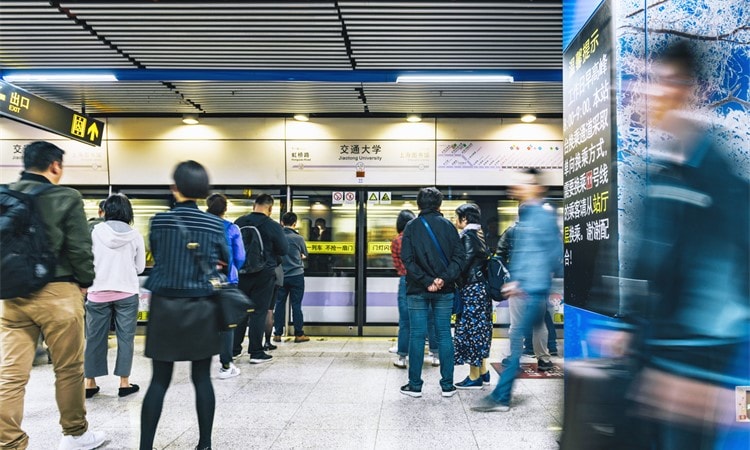
Shanghai Metro used to carry out maintenance daily. With its AI operation management system in place, maintenance now only needs to take place once every eight days.
(Photo: iStock)
For example, China’s Shanghai Metro, one of the world’s largest metro systems by route length, ferries an average of 10 million riders daily across 18 train lines. It generates billions of data points each day, such as the number of trains in operation, passenger flow during peak and non-peak periods, daily revenue and the temperatures of passengers screened during the COVID-19 pandemic. The data also comes in various forms, such as videos, images, numbers and words.
“AI turns raw, disconnected data points into actionable insights that can improve the operations of a business,” explains Wu. Since MiningLamp Technology implemented a smart operation management system for Shanghai Metro, the rapid transit system has seen its rate of train breakdowns reduce by 30%, while maintenance has been reduced from once a day to once every eight days.
The Future of Work
However, with AI regularly proving that it can do what humans can do, and sometimes better, an urgent concern has bubbled to the forefront of society’s collective consciousness — will machines inevitably take over jobs?
Such worries are not unfounded: a World Economic Forum report on the future of jobs found that automation may displace some 75 million jobs by 2022.
But it will also create 133 million new ones in the same period.
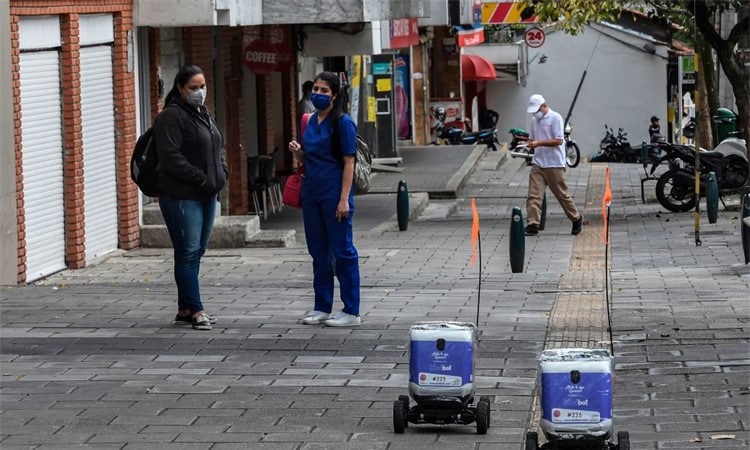
Automation may shift some 75 million jobs from humans to machines.
(Photo: Joaquin Sarmiento | Getty Images)
“There are a lot of opportunities to be harnessed from deploying AI and automation,” says Chia Song Hwee, Temasek’s Deputy CEO. “The key,” he emphasises, “is reskilling ourselves to capture these opportunities by embracing future technologies and skill sets.”
One way Temasek has been driving progress for the upskilling of our workforce is through the Temasek Tripartite Conversations. This is a series of engagements where Temasek helps develop roadmaps for a future-ready workforce, by working with leaders from the Singapore government, unions and Temasek’s portfolio companies hailing from sectors such as transportation, logistics and utilities.
During last year’s Networking Lunch for Trade and Connectivity, Ong Kim Pong, PSA International’s Regional CEO, Southeast Asia, shared the importance of people in the port operator’s digitalisation journey: it is, in fact, PSA’s staff, their skills and willingness to embrace change that lifts the company’s capabilities alongside automation.
For instance, the company began reskilling its manual crane operators to become automated crane operators in 2018, empowering them to manage six cranes at once while picking up new skills in automation.
Technology threatens to displace almost 1 in 5 full-time workers in Singapore by 2028. Temasek, together with Singapore’s tripartite members, is working to ensure the labour force has the right skills for the future.
“People’s abilities are augmented, not replaced by technology, and companies that invest in their people often find themselves the most adept at navigating new industry trends,” says Temasek’s Chia on the relationship between man and machine.
“Likewise, as an investor, building a resilient portfolio goes beyond investing in promising businesses and generating sustainable returns — it’s also about ensuring that the people in our ecosystem are uplifted as well.”
Temasek is an investor in BenevolentAI, MiningLamp Technology and PSA International.
